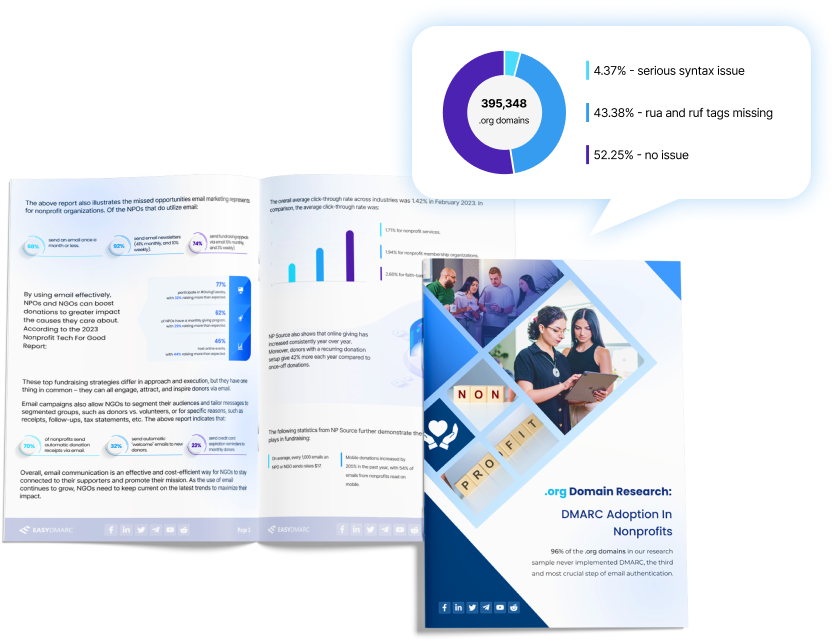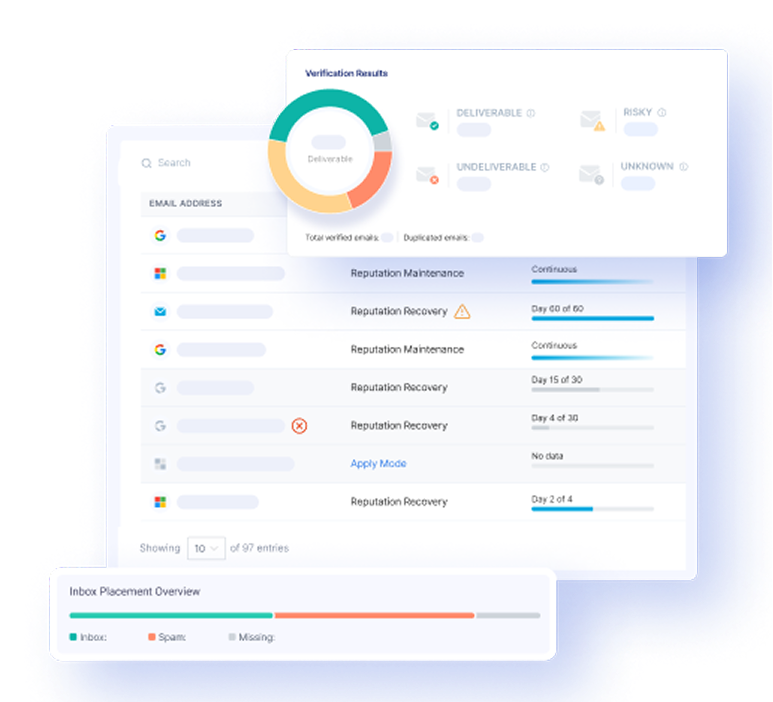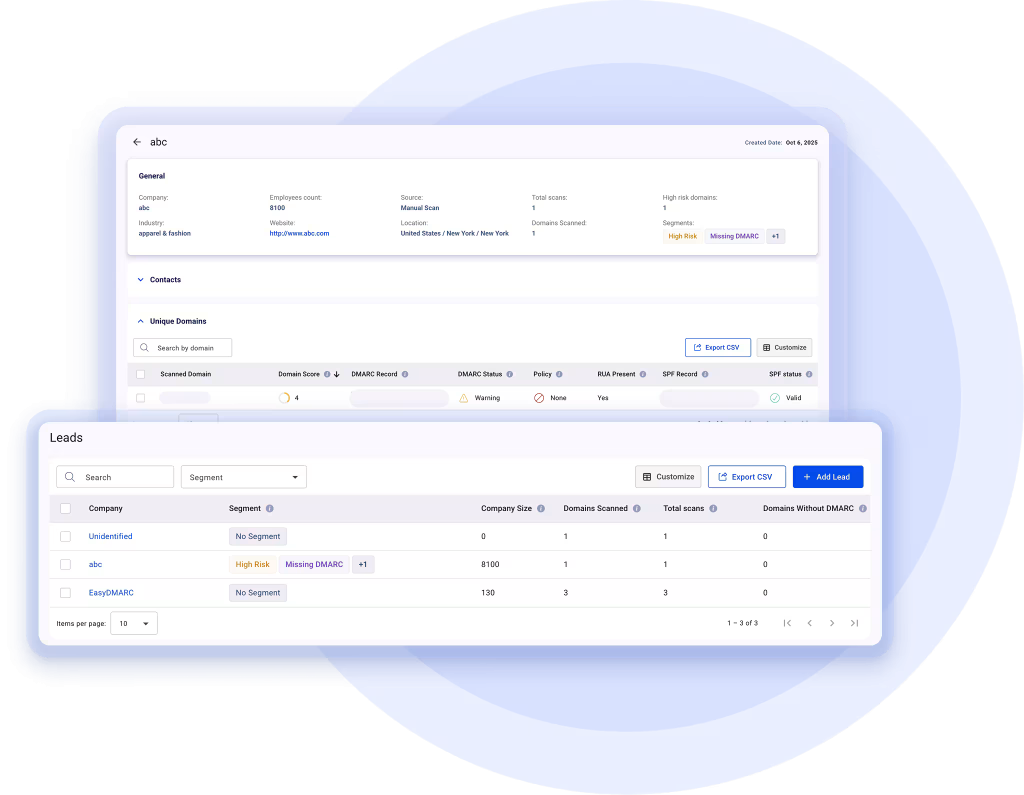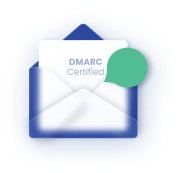We’ve talked about email being one of the top communication channels for all types of organizations many times, and many a time did we mention that more than 90% of cyberattacks are email-borne.
This time, we explored an industry where people try to do good for others. Nonprofits have always been on every “easy cyberattack prey organization” list, and the attacks show no sign of slowing.
This time, we decided to check how well nonprofits protect themselves and their stakeholders from phishing and spoofing and how well they’re doing with DMARC adoption.
We reviewed approximately 10 mln .org domains and found that only 3.98% (395,348 .org domains) of the sample have tried implementing DMARC. Of the ones that did, 30.68% of the nonprofits reached the highest level of DMARC enforcement. However, this number amounts to 121,290 domains, which is only 1.2% of our total sample.

Gain More insights about DMARC adoption in Nonprofits
The low DMARC adoption rate can be due to the challenging and technical nature of the process or because smaller organizations don’t have dedicated IT teams. Still, we hope to direct nonprofit managers and nonprofit directors to leverage email authentication and employ other security measures for the sake of the good work they’re doing.
Cloud-Based Email Authentication Platforms
Email authentication platforms are SaaS companies focusing on domain protection from malicious attacks like spoofing and phishing. The managed solutions help users verify the authenticity of email communication. It eliminates the possibility of the email being forged or tampered with in transit.
Several email authentication protocols can be used to verify the sender’s identity and protect the email integrity:
- Sender Policy Framework (SPF) allows domain owners to determine which IP addresses are authorized to send an email on behalf of their domain.
- DomainKeys Identified Mail (DKIM) adds a digital signature to the email message, verifying that the message has not been tampered with in transit.
- Domain-based Message Authentication, Reporting, and Conformance (DMARC) provides policy information and reporting capabilities that enable the domain owner to monitor and enforce authentication policies for their domain. DMARC can help prevent email spoofing and phishing attacks by guiding email receivers on handling messages that fail authentication checks.
Why Should NGOs Care?
Nonprofits use email all the time to communicate with their donors, stakeholders, and volunteers. The information they’re working with is also pretty sensitive (donation details, personal information, etc.). Thus, email authentication and DMARC compliance are a top priority for:
- Reputation protection
- Email deliverability boost
- Email fraud prevention
- Nonprofit data regulation compliance
What To Look For in an Email Authentication Service?
A great DMARC provider offers the following services:
- SPF, DKIM, DMARC, and BIMI tools for comprehensive email authentication
- Customized reporting to monitor email authentication status and performance
- Cost-effectiveness and flexibility in terms of growing with the nonprofit
- Continuous support and maintenance for peace of mind
Managed Detection Services
Managed detection services are cybersecurity tools that focus on detecting and responding to malicious activity on an organization’s network. These services detect potential threats using various technologies, including artificial intelligence, machine learning, and analytics. MDSs provide:
- Threat identification
- Investigation and mitigation
- Further recommendations
Why Should NGOs Care?
NGOs often operate with limited resources–an outsourced or a small IT team–making it challenging to keep up with the latest security threats within the organization. With managed detection services, NGOs get:
- Advanced automated threat detection for improved awareness of stakeholders
- Dedicated expert support for faster threat response and mitigation
- Cybersecurity risk reduction for an NGO to focus on their primary mission
What To Look For in a Managed Detection Service?
The cybersecurity market is full of Managed Detection Services that provide various features. Here’s what you should expect from an MDS vendor:
- Round-the-clock monitoring, detection, and response
- Vulnerability management
- Network endpoint and cloud workload monitoring
- Continuous threat hunting
- Security risk assessment
Well-known Managed Detection Service platforms are Rapid7, Sophos, Silver Sky, and others.
Web Vulnerability Scanner
Web vulnerability scanners are automated cybersecurity tools that scan web applications for security vulnerabilities. They can detect common web application vulnerabilities such as Cross-site Scripting (XSS), SQL injection, and Cross-site Request Forgery (CSRF). These scanners can be used to:
- Test for common attack vectors like form fields, cookies, and HTTP headers
- Check for compliance with various legal and financial standards and regulations
- Save time with automated testing
- Receive reports and take action against vulnerabilities
Why Should NGOs Care?
With the growing reliance on web applications, NGOs need to protect their online presence from cyber threats. Web vulnerability scanners are essential for NGOs to:
- Protect sensitive information that could leak through web applications
- Ensure they meet compliance requirements
- Leverage automation to combat limited resources
- Be more proactive in terms of security
What To Look For in a Web Vulnerability Scanner?
A decent Web Vulnerability Scanner is a cybersecurity monitoring tool that should be able to provide the following:
- Comprehensive vulnerability coverage to combat constantly evolving threats
- Detection accuracy for saving time and resources during the threat response stage
- Customizable scanning and reporting options to meet specific organization needs
- User-friendly design and integration with other tools for ease of use
- Continuous scanning and timely alerts to keep users up to date on the latest threats and vulnerabilities
Some tried and true Web Vulnerability Scanner platforms are Invicti (Netsparker), Burp Suite, Acunetix, and others.
Antivirus Software
Antivirus programs are such necessary cybersecurity tools that even if you’ve been living under a rock, you’d still have heard about their importance. They scan the computer for known threats like viruses, worms, and Trojans and neutralize them.
In a broader and more indirect scheme of things, antiviruses protect against:
- Phishing
- Ransomware
- Botnets
- Data breaches
Why Should NGOs Care?
Antivirus software is essential for NGOs due to the sensitive nature of nonprofit data. These organizations are often targets of malicious software that can cause data loss, corruption, or even system shutdowns. A reliable antivirus security program allows a nonprofit to:
- Save resources by shielding them from unnecessary risk
- Protect donor confidentiality and stakeholder PII
- Adhere to information security legal requirements
- Secure organization reputation
What To Look For in an Antivirus Software?
Antivirus programs usually have a standard set of features:
- Malware detection, quarantine, and timely removal
- Real-time scanning and alerts for swift response
- Scheduled deep scanning to ensure that no issue has been missed during real-time scanning
- Multifaceted scanning capabilities for email, browser, and firewalls for improved security in all vulnerable spots
- Automatic updates for patching recently discovered malware and threat responses
The “best-of” lists for 2023 include McAfee, Bitdefender, Norton, Malwarebytes, and others.
VPN
A VPN (Virtual Private Network) is among the most underrated and often misused cybersecurity tools. VPN is more than a means of watching Netflix content unavailable in your country. It’s an essential service that should be on your cybersecurity checklist. This secure connection allows your computer to access the internet privately and anonymously.
Here’s what a VPN does:
- Routes the internet traffic through an encrypted tunnel to protect data from third parties
- Prevents hackers from stealing personally identifiable information
- Helps bypass geo-restrictions and view blocked content in the region
Why Should NGOs Care?
VPNs are essential for NGOs because they allow:
- Working with sensitive information (donor data, financial records, and confidential documents) through a secure connection
- Accessing websites and services blocked in certain countries, allowing NGOs to remain connected and engaged with their supporters worldwide
- Protecting against cyberattacks, keeping NGO networks safe from malicious actors, and ensuring their data remains secure
Some well-respected VPNs include ExpressVPN, CyberGhost, Nord VPN, Speedify, and others.
Conclusion
Many cybersecurity tools available for nonprofits in 2023 can help protect them from cyber threats and ensure their data remains secure.
Email authentication platforms like EasyDMARC provide comprehensive email security solutions and help protect against email fraud. Managed detection services allow NGOs to detect and respond to malicious network activity. Web vulnerability scanners can identify potential security vulnerabilities in web applications. Antivirus software protects against malicious software and identity theft. And finally, VPNs can provide a secure connection to confidential data and access to geo-restricted content.
By using these tools, nonprofits can ensure their data remains secure and their online presence is protected from cyber threats.
Be the next nonprofit to protect your domain infrastructure with EasyDMARC’s state-of-the-art cloud native platform!





